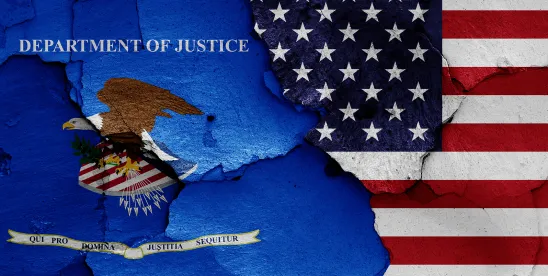Key Takeaways
- The Department of Justice (DOJ) launches a new “Trade Fraud Task Force” with the Department of Homeland Securityto aggressively pursue enforcement actions against those who seek to evade tariffs and duties — including under the broad reach of the False Claims Act (FCA).
- This follows the DOJ’s recent settlements of evasion cases brought under the FCA involving multi-layered wood flooring, plastic resin, extruded aluminum products and quartz surface products.
- The U.S. Court of Appeals for the Ninth Circuit recently held that the FCA’s “sweeping scope” does not carve out Customs duties, affirming that the DOJ can ensure compliance with trade laws outside the traditional trade enforcement scheme.
- Importers should reassess their Customs compliance programs amid increased FCA enforcement and growing exposure to civil and criminal penalties.
Under U.S. law, U.S. importers are responsible for accurate and complete reporting, including in their classification and valuation of goods to Customs. That compliance burden has already become increasingly complex amid the Trump Administration’s new country-specific reciprocal tariffs and national security duties — currently imposed on steel, aluminum, and copper and their derivative products, as well as automobiles and auto parts — with potentially more trade measures on the horizon. Now, importers must also contend with heightened enforcement risk.
DOJ Ramps Up Trade Enforcement with FCA and Task Force
Just this past Friday, the DOJ launched its cross-agency “Trade Fraud Task Force” with the Department of Homeland Security to jointly pursue those who violate Customs laws through “duty and penalty collection actions under the Tariff Act of 1930, actions under the False Claims Act {FCA}, and, wherever appropriate, parallel criminal prosecutions, penalties, and seizures under Title 18’s trade fraud and conspiracy provisions.”
By explicitly referencing the FCA alongside other tools, the DOJ has signaled its intent to pursue duty evasion outside the traditional enforcement scheme — and the FCA’s reach is broad. The FCA prohibits acts of fraud against the government and encompasses actions that not only involve actual knowledge but also deliberate ignorance or reckless disregard of the truth or falsity of the information. It also encourages private individuals to file qui tam lawsuits to combat fraud, which allow them to receive 15-30% of any amount recovered. Penalties under the FCA can be steep, imposing a civil fine per violation plus treble damages.
This announcement comes on the heels of the DOJ’s recent multi-million-dollar settlements of Customs evasion cases brought under the FCA — underscoring the government’s escalating prosecution of trade-related matters outside of the traditional enforcement scheme. As touted in the DOJ’s Trade Fraud Task Force announcement, “{s}ince March of this year, the Commercial Litigation Branch has reached civil settlements to resolve allegations of improperly evaded customs duties across a wide range of products, including multi-layered wood flooring, plastic resin, extruded aluminum products, and quartz surface products.”
Courts Confirm FCA’s Role in Customs Enforcement
Bolstering the DOJ’s aggressive use of the FCA, the U.S. Court of Appeals for the Ninth Circuit in Island Industries Inc. v. Sigma Corp. issued a decision in June 2025, affirming the reach of the FCA against a pipe importer that made false statements on Customs forms to avoid paying tariffs on imports from China. As the Ninth Circuit made clear, the FCA was intended to “reach all types of fraud, without qualification, that might result in financial loss to the Government,” including evasion of obligations to pay the government. And although Section 1592, Customs’ penalty statute, overlaps with the FCA, the Ninth Circuit held that Section 1592 was not the sole avenue for recovering duties — instead, the FCA could proceed in parallel with the government’s pursuit of other alternative remedies.






 />i
/>i
